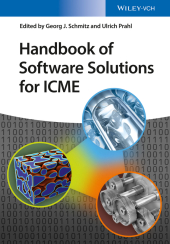 Neuerscheinungen 2016Stand: 2020-02-01 |
Schnellsuche
ISBN/Stichwort/Autor
|
Herderstraße 10
10625 Berlin
Tel.: 030 315 714 16
Fax 030 315 714 14
info@buchspektrum.de |

Ulrich Prahl, Georg J. Schmitz
(Beteiligte)
Handbook of Software Solutions for ICME
Herausgegeben von Schmitz, Georg J.; Prahl, Ulrich
1. Auflage. 2016. XXX, 595 S. 3 SW-Abb., 11 Farbabb. 244 mm
Verlag/Jahr: WILEY-VCH 2016
ISBN: 3-527-33902-7 (3527339027)
Neue ISBN: 978-3-527-33902-0 (9783527339020)
Preis und Lieferzeit: Bitte klicken
INTRODUCTION
Motivation
What Is ICME?
Industrial Needs for ICME
Present ICME
PROCESSES AT THE COMPONENT SCALE
Overview of the Production Chain
Primary Shaping Processes
Forming Processes
Annealing Processes
Joining Processes
Coating Processes (Thick Films)
Deposition Processes (Thin Films)
Machining Processes
Fatigue
Corrosion Processes
Recycling/Metallurgy
MICROSTRUCTURE EVOLUTION
THERMODYNAMICS
DISCRETE MODELS
DETERMINATION OF EFFECTIVE PROPERTIES
NUMERICAL METHODS
PLATFORM APPROACHES/ PRESENT ICME
ROADMAPS FOR FURTHER DEVELOPMENTS
As one of the results of an ambitious project, this handbook provides a well-structured directory
of globally available software tools in the area of Integrated Computational Materials
Engineering (ICME).
The compilation covers models, software tools, and numerical methods allowing describing
electronic, atomistic, and mesoscopic phenomena, which in their combination determine the
microstructure and the properties of materials. It reaches out to simulations of component
manufacture comprising primary shaping, forming, joining, coating, heat treatment, and
machining processes. Models and tools addressing the in-service behavior like fatigue, corrosion,
and eventually recycling complete the compilation.
An introductory overview is provided for each of these different modelling areas highlighting the
relevant phenomena and also discussing the current state for the different simulation approaches.
A must-have for researchers, application engineers, and simulation software providers seeking
a holistic overview about the current state of the art in a huge variety of modelling topics.
This handbook equally serves as a reference manual for academic and commercial software developers
and providers, for industrial users of simulation software, and for decision makers seeking
to optimize their production by simulations. In view of its sound introductions into the different
fields of materials physics, materials chemistry, materials engineering and materials processing
it also serves as a tutorial for students in the emerging discipline of ICME, which requires a broad
view on things and at least a basic education in adjacent fields.


